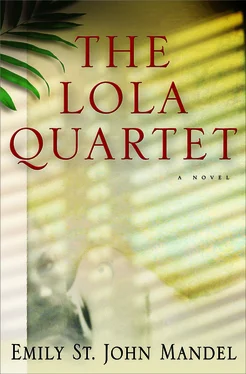"You came!" Bernadette said. She was flushed and lovely, already a little drunk, wearing a miniskirt that he couldn't help but notice was short even by miniskirt standards. "I'm so glad you're here."
"I'm glad I'm here too," he said. "What's this we're listening to?" She was pressing a plastic cup of beer into his hands.
"The Klezmatics," she said. "I don't love them, except this one song. Can you hear it? It's klezmer, but it's also jazz."
"I don't know that much about klezmer," he said. It was nice to be in a conversation with someone instead of alone in the dorm room, and he didn't want the moment to end. She had hair that caught the light, dark curls falling over her shoulders.
"Then stay a while and keep listening," Bernadette said. "Another drink?"
She floated away from him. He didn't know anyone else here but they all seemed to know each other. Jack stayed as long as possible in the warmth and the brightness, trying to find a conversation, until sometime near midnight he glanced across the room and Bernadette was kissing someone else, a cellist whose name he could never remember. He drifted outside and over the sparkling grass to Lewins Hall, drunk, the stars wheeling. He hoped Deval might be back from wherever he'd gone, but the room was dark and still. He slept with his bedside lamp on, a t-shirt thrown over it to blunt the light, and woke hungover to the smell of scorched fabric.
F o u r d a y s later Deval came into the room one morning while Jack was getting dressed, waved instead of saying hello, lay down on top of his bed, and closed his eyes.
" Where were you?"
"I drove her to Virginia," Deval said. "Then I hung around for a few days."
" Where in Virginia?"
"Somewhere in the middle. Place called Carrollsburg." He kicked off his shoes. "Have you ever seen her tattoo?" He gestured vaguely at his shoulder without sitting up.
"I could've taken her."
"It was a spur-of-the-moment thing. You were asleep."
"So you saw where she's living?"
"It's an okay place," Deval said. " Quiet little house in a small town. Nowhere anyone would look for her. She's got the whole basement to herself. I think it'll be okay."
"You know what's weird? The last time I saw her, she had all this long dark hair, and now it's short and blond. It's like she was in disguise."
"Yeah, about that." Deval sat up. "She's got a complicated life," he said. "She asked me to tell you— well, to ask you, I guess— look, she doesn't want you to tell anyone you saw her. Seriously, no one. It's really important, okay?"
"Okay."
"When I say important, I mean this is like the most important thing anyone's ever going to ask of you."
"Okay, I get it. I won't tell anyone."
"Thanks." Deval lay back down on his bed.
Dj a n g o R e i n h a r d t was a prodigy at thirteen playing the cafés of Paris. A burn victim at eighteen when he came home from a gig and knocked over a candle in the caravan where he lived with his young wife. The materials for the celluloid-and-paper flowers she made to supplement their income were highly flammable, and the caravan flashed quickly into flame. A small miracle at twenty, when he emerged from a long convalescence after the fire that ruined half his left hand and revealed an improbable new technique: he worked the frets with two fingers and made his own substitutions for the standard major and minor chords. The miracle was that he played better after the fire than before. He carried the fire with him through all the days of his life, in his two curled fingers and in the way he used a match to hold the bridge of his battered guitar up to the proper height.
"A match ," Deval said. "Of all the things he could have used."
Deval's mother had given him a biography of Django Reinhardt as a high school graduation present, and he liked to read his favorite sections aloud in the dorm room at night. Jack appreciated the distraction.
Django Reinhardt was always good, but he was at his best with Stéphane Grappelli. They met as members of a fourteen-piece orchestra that played uninspired music for tea dances, Grappelli on violin and Reinhardt on guitar, until one day Grappelli broke a string. He played a few notes of a jazz melody, trying to get his violin in tune, and Reinhardt echoed him on guitar. A bass player and a rhythm guitarist jumped in, and this was the beginning of the Quintette du Hot Club de France. They played together with enormous success. Reinhardt hadn't spent much time in school as a child; Grappelli taught him how to read. Reinhardt went on a shaky American tour without him, dabbling in electric, traveling unsteadily with unfamiliar guitars, but only when he returned to Grappelli did he sound like himself again.
"Why are you telling me so much about Grappelli?" Jack asked. "I thought you wanted to be Reinhardt."
"Because this is what I keep wondering." Deval was sitting up on his bed, bright-eyed in the lamplight. The Quintette du Hot Club de France playing on his stereo, the underwater sound of old recordings. "I can play the guitar and maybe I'll be really good someday, Jack, but who will be there with me? Who will be my Grappelli?"
De c e m b e r s h i f t e d into a colorless January. Jack didn't want to be at music school, he knew he was taking too many pills, he knew the little baby with the wisp of dark hair was probably Gavin's and he couldn't imagine why he wasn't supposed to tell anyone about it, but Deval had repeated three or four times that Jack should tell no one he'd seen Anna or the child. He hinted that Anna was in some kind of trouble. He made it sound as though lives were at stake, but still he managed to appear perfectly serene as he moved through his days. Skipping half his classes, spending hours in the practice rooms, reading about gypsy jazz and listening to scratchy recordings of the Quintette du Hot Club de France in the evenings. He was making long phone calls to Virginia at night.
"I can't tell you how much I envy you," Jack told him once, near the end, when they'd walked down the hill into town to get drunk. It was almost two a.m. Anna had been gone for three or four weeks. Jack and Liam were slumped in a booth in the back corner of a half-deserted Irish bar they'd discovered where the beer was cheap and no one cared what they put on the jukebox, and Jack had been happy earlier but now he was sinking into the morose kind of drunk that lends itself to regrettable statements.
"Yeah, I can see why," Deval said. "I'm in love with an underage girl who lives in hiding in a different state with a fucking baby, school bores me half to death but my mother will kill me if I don't get a degree, and I've got a class in six hours. What's not to envy?"
"You've got the music," Jack said. The idea of having the music or not having the music was something he'd never had an easy time explaining but Deval smiled, Deval seemed to understand, and Jack felt such gratitude at being understood in that moment that he let Deval choose the next three songs on the jukebox.
At t h e beginning of February, Jack left Lewins Hall en route to the practice rooms and a man he didn't recognize fell into step beside him.
"Jack, right?"
"Yes?"
The man was in his twenties, blond, with pale eyes and a ring through his eyebrow. He was dressed in a way that seemed calculatedly forgettable— a gray sweatshirt, black shoes, jeans— but any chance of anonymity was ruined by his tattoo: an extravagantly detailed goldfish on the side of his neck, brilliant orange. Jack found it hard to look away. He hated needles. Tattoos made him queasy. His hand drifted to his own neck in sympathy.
"You seen Anna around?"
Jack stopped walking, so the man stopped walking too. "Anna.?"
"Anna Montgomery, Jack. Anna from Florida. The girl with the baby." He was standing a little too close. Jack could smell his aftershave. There was nothing friendly in the man's blue-eyed stare. "The girl who visited you last month," he said.
Читать дальше












